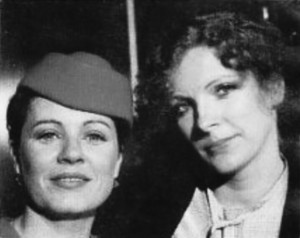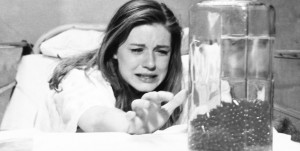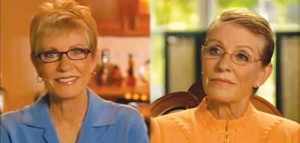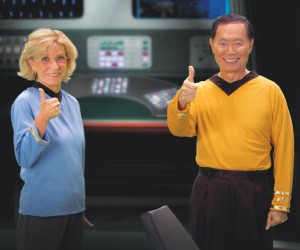
Chatty Patty
She’s played blind and deaf, identical cousins, a drug addict, a lesbian, an advocate for the Social Security Administration, and so much more. But Patty Duke’s most challenging role has been portraying herself.
by Blase DiStefano
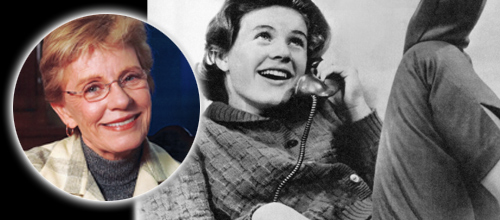
Patty Duke, born Anna Marie Duke in 1946, was brought up by an abusive couple, John and Ethel Ross, though you would never have known it from watching The Patty Duke Show or reading about her in the early- to mid-’60s. She seemed like your average everyday teenager, but behind the façade was a tortured girl. The Rosses manipulated Anna’s mentally ill mother into basically giving them complete control over her, to the point of giving Anna prescription drugs and alcohol. They changed her name to Patty (after Patty McCormack, a popular child actress at the time).
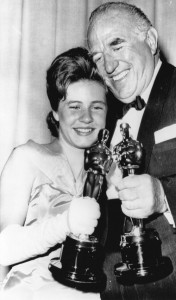
By the time she starred in her own TV show, Duke had already triumphed on Broadway in The Miracle Worker. And about the same time as the debut of The Patty Duke Show, Duke won an Oscar for her role as Helen Keller in the film version of the play.
Duke went on to marry, make more films (including Valley of the Dolls), divorce, attempt suicide, win more awards, date, break up, have an affair, get pregnant, marry, divorce, marry, make more films, win more awards, attempt suicide, divorce….
Finally, in the early ’80s, Duke was diagnosed with bipolar disorder. She began taking lithium, and her life changed. She married Michael Pearce in 1986 and is still with him; they live in Idaho. Her autobiography, Call Me Anna, was published soon after and became a best-seller. She spoke out for people with AIDS. She was elected president of the Screen Actors Guild in 1985. She made numerous TV films, especially for Lifetime Channel. She became a spokesperson for mental health, a role that she continues today. Her recent venture as spokesperson for the Social Security Administration’s website finds her in a position of public service; the ads are a treat for baby boomers.
Duke was open, honest, and funny during her interview with OutSmart from her home in Idaho. Though there are great stories here, we barely scratched the surface of her abundant life.
Blase DiStefano: Hi. Do you prefer to be called Anna?
Patty Duke: I’ll answer to just about anything, but Anna is what I go by, yeah.
This interview is going to run in our May issue, which is the month of Mother’s Day.
Lovely. How nice.
I know your mother passed away in ’93, and I know that it would be impossible for you to tell me about her in a few words, but can you give our readers an idea of how you felt about her, especially after the misunderstandings subsided?
By the time I was six years old, my father had left, and my mother was in clinical depression—of course, we didn’t even know that term at that time—and she was manipulated to give me up to live with these people called the Rosses. And they were gonna make me a star. My mother’s insecurities ran so deep that her maternal instincts took a back seat. At any rate, I was attached to my mother at the hip.
What finally, miraculously happened was that through the years she would come to live with me for a while, and then she would go back to live with my sister. She came to Idaho with us when we moved here 22 years ago. She loved her assisted-living place so much. Now remember, she was from New York, and she said to me [Duke imitates her mother’s New York accent], “Anna, I love it here. I’m gonna die here.” Fortunately, she was diagnosed at that age, and she was put on medication and talk therapy, and the last 15 years of her life were so much fun. We saw her every day and laughed most of the day. She understood that I had totally and absolutely forgiven her for whatever I thought her grievances were—for whatever I thought she did by giving me up to those people and what happened to me there. I tell you, it was miraculous.
It was all from the medication?
It was from the medication, and also from my medication, whereby I was able to learn how to forgive. Except it took longer to learn how to forgive myself.
We miss her terribly, but I do my imitations of her. The family members think she’s still around.
[Laughs] This is another mother question. How do you think you would have reacted if one of your children had said, “Mom, I’m gay”?
Well, I would like to believe, and had believed before I had children, that it wouldn’t be an issue.
Do you remember how you even knew what gay meant?
One of the wonderful side effects of being in show business is that we’re exposed to all kinds of life conditions. From an early age I knew what gay was, but, remember, I grew up in a time where it was still something you whispered.
When I did Valley of the Dolls and it became such a magnet for gay people and such a cult movie, that’s when I was exposed more and more to gay people—usually men, but women as well—and the gifts that these people bring to the planet—I mean, I’ve wallowed in it [both laugh] for a long time.
Let me go back to the question about what if one of my children was gay. My firstborn nephew was born into an extremely Catholic family. When he was very young, I thought maybe he had homosexual tendencies, but we were not the kind of family where you would say to each other, “Oh, by the way, maybe you should pay attention to this over here.” Eventually, in his adulthood, he came out to me and to his mother. The big fear was his mother. Well, we were all blown away by the fact that all this woman cared about was that her son was happy.
At any rate, my exposure to and with gay people has brought me so much more understanding and compassion and respect, which is I think one of the things … there are pockets in this country where that kind of respect still doesn’t exist.
We thank you. This is sort of a mother question. You starred with Sara Botsford as a lesbian couple trying to have a child after being turned down for adoption in By Design.
Yes, we did.
By the way, I recorded that on my old VCR at the time, and I’ve still got the videotape.
Oh my God! Wait a minute, Blase. I don’t have that one.
Then I’ll find it and record it and…
Please do. I’m gonna make you feel obligated now.
I don’t mind.
That was a fascinating experience, because I was not as evolved…
It seemed like you were, because…
I take to different human conditions easily. I think that’s one of the reasons that I’ve been able to act for so many years. There were moments of embarrassment for me, but it would have been that way if there had been a heterosexual in the room—being bare-chested and stuff like that. And that didn’t have anything to do with the fact that they were lesbians—that had to do with the fact that the lady didn’t have her clothes on half the time.
[Laughs] Do you remember getting any negative feedback at the time?
None. But it had a fairly small release. I’m thinking that had it been seen by a broader audience, there might have been.
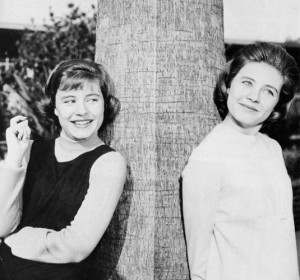
Speaking of lesbians, one of my colleagues wanted me to ask you if Cathy Lane is a lesbian.
Interesting. I’ve never, ever had that question before! Oh, that’s wild. You know, when I think about it, she could be. She’s fairly asexual throughout the series. Isn’t that fascinating. I’m gonna start that rumor. [Both laugh]
Well, we’re gonna help you.
Okay. [Giggles]
I saw you on The Joy Behar Show recently, and the two of you weren’t sure if Troy Donahue was still alive. He died in 2001.
Shame on me for not knowing that.
You can’t keep up with everybody.
I came from a mother who read the obituaries religiously every day. So I oughta be better at it. So he is gone. Of course, when I was a kid and worked with him, I didn’t have any gaydar, as they call it.
He wasn’t gay though.
Oh, he wasn’t?
No. Everybody gets him confused with Tab Hunter, who is gay.
You know, you’re absolutely right, and I worked with both of them.

Troy Donahue even made a joke…
“Do people get you and Tab Hunter confused?” “Yes, I’m the straight one.”
That’s it! I had a major crush on Troy Donahue.
Who didn’t!?
But because of your not-so-ideal childhood, did you even have crushes?
Oh yes. I didn’t bother revealing it to the Rosses. And many of them were crushes totally private, totally inside of me. I wasn’t geared to talk to anyone about things like that.
I’ll tell you I had a crush on Richard Burton. I finally wound up in the tabloids. I was a threat to Liz. I was 14 at the time.
That’s hilarious.
I’m telling you, people can come up with some doozies.
Speaking of Troy Donahue, I have a question about Suzanne Pleshette [Donahue and Pleshette were married for nine months in 1964]. In an article I wrote about Suzanne Pleshette, I mentioned that you had said her fingernails were rather long when she co-starred with you [Pleshette replaced Anne Bancroft on Broadway in The Miracle Worker]. And Pleshette said that if I checked the photo of the two of you I would see that her fingernails were not that long. She said that you weren’t as reliable “pre-lithium.” Is that an inappropriate question for me to ask you?
No, it is not. And certainly I was not as reliable pre-lithium. However, I only mentioned her fingernails in the context of what kind of things two people have to do to play these roles without killing each other. I mentioned that Suzanne’s nails were long and that she cut them way down, which was a sacrifice.
She did like very long fingernails, from what I’ve read.
Oh, she was glamorous. My God, she was glamorous. And funny. Funnier than hell. I think that because I went out with Troy for dinner a couple of times, that got under her skin. I think some of her answers about me changed after that. Once again, it is the human condition.
But we were crazy about each other. We did not have the same bond as Anne Bancroft and I did, but we did have our own unique relationship. When Suzanne came to the show, it was the first time I ever put on a trenchcoat with mink lining. [Both laugh] She was fun. She would play “girls” with me. I’m sorry if I gave her any discomfort, ’cause I sure never meant to.
That was a long time ago.

But if you’ve hurt somebody in some way, it doesn’t matter how long it’s been that you finally get the message—you have to somehow try to make it right.
I was brought up Catholic and you were too, right?
Yes indeed.
Did it affect you at all and…
It still does. Last Sunday, we went to our godson’s first Holy Communion, and the tug-of-war got going inside of me. “I want to be a part of this.” “No, I don’t. They have terrible rules.” “Oh, I just want to be a part of this.” [More emphatic:] “No, you don’t. They have horrible rules.” So that dilemma goes on. I have searched through many religions. It seems to be that I am a person who wants that desperately. But I’ve yet to be able to hang onto one.
I’ve found that it has to be spiritual. It can’t just be organized religion.
You’re right. I agree with you.
From religion to suicide. I know you tried a few times. Do you have anything to say to young people who are considering it?
Oh, sure. Please try to include in your mind all the things you would miss and all the people whose lives would be altered forever, and not necessarily in a good way. But the real answer is that there is not just hope, there is a fix for most of our mental-health issues, if we can just get past the fear of being labeled crazy and recognize that this is a physiological brain problem. Many people feel that it’s a character thing. You know, “You’re crazy ’cause you’re bad.” And that simply isn’t the case. We’ve been so bad about communicating it for thousands of years that we’re trying to step up the process now.
OutSmart magazine is going to be a sponsor for the Walk for Mental Health Awareness in October. Do you know of any organizations that are making a big difference?
The big granddaddy of them all is NAMI, the National Alliance for Mental Illness. They are the touchstone, as far as I know, for people who aren’t conversant with this. Who do you call? What do you do? “I’m finally willing to get help. Where do I get it, how do I get it? Who will pay for it?”
There are also organizations around the country for bipolar disorder, kind of self-help groups. Any time you can find a place where you feel safe enough to talk about it, go to that place.
This is not necessarily on the subject of mental health—Valley of the Dolls.
Oh, yes it is. [Both laugh]
When was the last time you saw the film, and has your opinion of the film changed over the years?
To the best of my recollection, I saw the film in San Francisco last year or the year before. [The event was titled “Sparkle, Patty, Sparkle: An Evening with Patty Duke.”] And I was the dog-and-pony show. [Both laugh] My feelings about the film have changed almost 180 from way back when.
When it first came out, I was mortified. I thought my performance was so over the top, and somehow I deluded myself when we were shooting that this really was an exploration of somebody who had mental problems and addiction problems. As we all know, it is as far from that as you can get. Now, I will tell you this, it is the gay community all over this country that has brought me along to enjoy, not every second of the film, but most of it. It is the vehicle that brought me to the gay community, so I have to love it for that.
Ditto The Patty Duke Show. I know it was rough on you, and I read that you weren’t allowed to watch the show at the time.
That is correct. There are still many episodes that I have not seen. I’m too cheap to buy a VC, or whatever they’re called—ABCDEFG … what are they called?
[Laughs] DVD. So how do you view it now?
I’m old enough to be able to have some benevolence and, though I still hate Patty’s hair, I enjoy it, and I’m proud for my grandchildren to see it. I recognize that we did a really good job—for that genre.
I never missed an episode.
Bless your heart.
It was fun, and the Social Security ads that are a takeoff of the show are also fun.
That was Commissioner [Michael] Astrue’s idea, and he wrote the script for it. When I read the script for it, I didn’t know he had written it, and all I could think of was, “Where was this guy when we were shooting the episodes [of The Patty Duke Show]?”
So how did your association with Social Security come about?
The Commissioner’s office—I love that phrase “Commissioner’s office”—the “walls” called me [giggles]. Someone from the staff got in touch with my husband and asked if he thought I would have any interest in it. And I said, Oh, yeah. And that was it.
I love when I get a chance to do a public service that for my taste is either dignified or funny or both, and this was the opportunity for me. And that was just when we did Patty and Cathy in the first go-round. Then the second go-round, they brought the whole family together, except for Jean Byron [who played Patty’s mother], who had passed.
The campaign is having the desired effect. More and more people are going online to file and get other pertinent information. What the commissioner said was that they were looking for a baby boomer who had some acknowledgment in the American community.
Now we’ve done two with George Takei.
You trade quips with him, and you’ve got Spock ears in one of the ads.
That’s what you do when your lobes get too long—they get pointy on the top.
[Laughs] Did you meet George Takei’s husband, Brad Altman?
I did. He’s a good hugger.
Let me tell you the unique part about this last one. My schedule conflicted with everybody else’s, so they went ahead and shot George’s part of it in split-screen. Isn’t that hysterical? Then I came later, and it was like doing Patty and Cathy all over again. Talking to nobody. [Both laugh]
Anyway, I got to meet George a few weeks ago in New York, and Brad was with him. George is the most charming, witty—very, very witty … and you can ask him a question on any topic. And I mean any topic. And he’s informed, but he’s not like a braggart.
Do you approve of gay marriage?
I do approve of gay marriage. You know what? I can’t figure out why so many of us think we have the right to judge someone else’s human behavior, love, and expression of that love. I’m sorry, I’m not equipped to judge that.
I suggest to you, as a buddy now, we must continue to do our search for the spiritual place where we are comfortable. As long as we live by the Golden Rule, we’re okay.
I agree completely. This has actually been spiritual for me.
Bless your heart.
For more info on Patty Duke’s Social Security ads, go to socialsecurity.gov; for more info on Patty Duke, log on to officialpattyduke.com.


